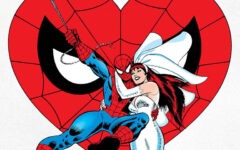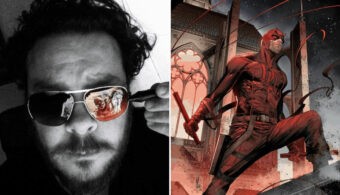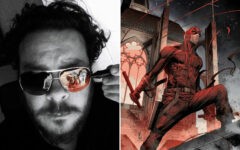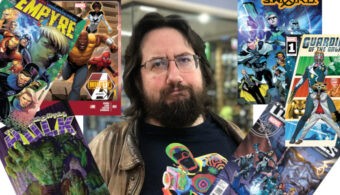Joe Kelly is an American comic book writer and screenwriter who, after a fulminant debut in 1997 with the Deadpool’s title, he wrote for a year and a half stories of the X-Men, before moving to DC Comics to write, for five years, the stories of Superman’s Action Comics.
Joe joined the Man of Action Studios, with Steven T. Seagle, Duncan Rouleau and Joe Casey, and is also one of the creators of the animated series Ben 10.
Hi Joe,
thanks for joining us at Lospaziobianco.
Your interview will be part of a special we are going to issue on September celebrating 50 years of Uncanny X-Men; we know that your career moved in different directions since the end of 90′ (when you worked on the X-Titles) and we suggest to our readers to look also at your current and last works… Anyway, by now, let’s talk about X-Men…
Thank you for having me! My time on the X-Men was critical to my career, and I appreciate having the chance to look back!
You and Steven T. Seagle are friends and co-workers at Man Of Action Studios, I don’t think it was coincidence that you two were working simultaneously on X-Men and Uncanny X-Men. Do you want to tell us how you became writers of these two titles?
Actually, Steve and I met on the X-Men! I was writing Deadpool and Daredevil and was offered the opportunity to work on X-Men. They were shaking up the creative teams (as they so often do) and Steve was offered Uncanny X-Men. I’m pretty sure that the first time we ever met face-to-face was in the Marvel offices! We became very fast friends and have worked together ever since. I met Duncan Rouleau when we did the Juggernaut one-shot together, and Joe Casey when he took over Cable. Marvel has these massive summits where everyone gets together and talks about a year’s worth of story, so that’s how we all started working together.
Do you and Steven agreed with the narrative of the two mutants titles or each followed his own agenda?
What was great about working with Steve on those books was that we had very different interests that complimented one another. I was totally into the new characters (Marrow, Maggot, Doc) as much as the classics, and wanted to tell a certain type of story. Steve was more into the classic team and telling a different kind of X-Men tale. So we never had to fight over characters, and we didn’t step on one anothers’ toes. It was sort of perfect, because there was no ego involved, we each had a playground of our own and we fed each other ideas all the time.
Before starting to work on the X-Men you had already had to deal with the Marvel’s mutants, thanks to the excellent work done on Deadpool. What were the differences between the work on that title and the X-Men?
There are so many differences I don’t know where to start. Deadpool was a) a solo book, b) a barely known character, and c) most likely to be cancelled in 6 issues. (That’s how Idelson and I looked at it at the time!) Because it was such a “small” project, we were left alone to do pretty much whatever we wanted for a long time. Also, there were no films, cartoons, etc. for Deadpool, so he was “our” which made for lot of fun and creative freedom.
On the other hand, the X-Men were a) a team book, b) the most popular characters on the planet and c) a pillar of the Marvel Universe with decades worth of history! So the experience was much more tightly controlled by Editorial, we really had to watch what we did in the book and there was a fair amount of pressure. Luckily, Steve kept me sane during that time – no matter how tough things got we still managed to have fun and find stories we wanted to tell. He was a life saver – and that “trial by fire” forged our friendship for sure.
Reading some of your statements in the web, we found that you still follow, as a reader, the events of X-Men. What do you like currently in the mutant’s world and what would you change if you were still an X-writer?
Sorry, but your internet spies are wrong! I’m a fan of the characters and the writers/artists who work on the books, but I haven’t read an X-title for a long time. I have nothing against them – I just tend to read other sorts of books to get myself out of the superhero mindset since I spend a lot of time working in that space.
Do you think that the basic concept of X-Men (inequality, fear of mutants, etc) was a good one and/or a good excuse to talk about these issues in a comic book?
Absolutely! That’s the core of why the X-Men continue to endure. Whether you look at it as a book about race, puberty, teen angst, political struggle – the X-Men are a minority who are always in conflict with the majority that they are sworn to protect. Dramatically speaking, it’s a perfect set up, adaptable to any time period and social cause.
Plus, on a personal note, I like my Superhero comics with a healthy dose of real-world allegory. I think we have a responsibility to try and use the genre to pose questions to the audience about the world around them, and the X-men are perfect for that.
Interview conducted by email and ended on 2013/03/22






















